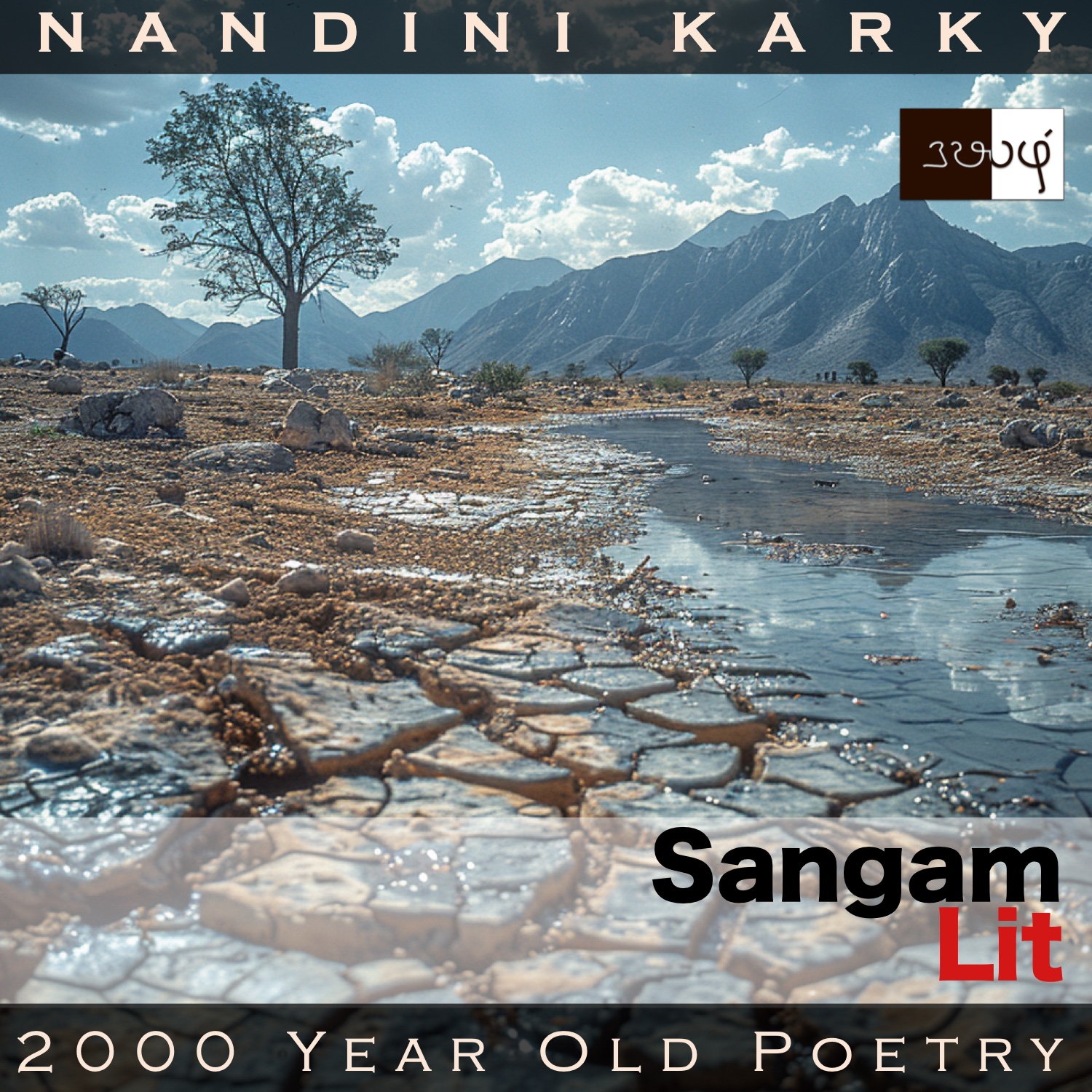Podcast: Play in new window | Download
Subscribe: Apple Podcasts | Spotify | Amazon Music | Android | iHeartRadio | TuneIn | RSS | More
In this episode, we hear of an ancestor’s fame, as depicted in Sangam Literary work, Puranaanooru 389, penned about the Leader Naller Muthiyan by the poet Kallil Aathiraiyanaar. The verse is situated in the category of ‘Paadaan Thinai’ or ‘Praise’ and puts forth a request to a leader of a hilly domain.

‘நீர் நுங்கின் கண் வலிப்ப,
கான வேம்பின் காய் திரங்க,
கயம் களியும் கோடை ஆயினும்,
ஏலா வெண்பொன் போருறு காலை,
எம்மும் உள்ளுமோ பிள்ளைஅம் பொருநன்!’
என்று ஈத்தனனே, இசைசால் நெடுந்தகை;
இன்று சென்று எய்தும் வழியனும் அல்லன்;
செலினே, காணா வழியனும் அல்லன்;
புன் தலை மடப் பிடி இனைய, கன்று தந்து,
குன்றக நல் ஊர் மன்றத்துப் பிணிக்கும்
கல் இழி அருவி வேங்கடம் கிழவோன்,
செல்வுழி எழாஅ நல் ஏர் முதியன்!
ஆதனுங்கன் போல, நீயும்
பசித்த ஒக்கல் பழங்கண் வீட,
வீறுசால் நன் கலம் நல்குமதி, பெரும!
ஐது அகல் அல்குல் மகளிர்
நெய்தல் கேளன்மார், நெடுங் கடையானே!
Seeking a person’s grace by recollecting the greatness of another is the core of this verse. The poet’s words can be translated as follows:
“‘Whether it’s a harsh summer, when water-filled palmyra ice apples harden, when the forest neem’s shoots dry-up and when deep ponds become parched or it’s a time when the white-gold planet refuses to move from the south, make sure to think of me, O supplicant of young years!’, said he and gave generously, that great and famous king! He is not in a place, where I could go and reach. If at all I were to go, he is not someone who would remain unapproachable.
Making the naive female elephant with spots on its head suffer, they bring its young calf and tie it in the town centre of the fine town in the hills. Such is the domain of Venkatam, filled with cascades descending from the mountains, and you are its lord, O Naller Muthiyan, whose mind doesn’t wander wherever it wants. Akin to Aathaanungan, you should end the suffering of my famished kith and kin and render fine and excellent gifts, O lord! May your royal maiden, having delicate waists, never hear the beats of ‘Neythal’ in your wide front yard!”
Let’s delve into the words. The poet starts by recollecting the words of a person who had asked the poet to remember him, whether it was the harsh and dry times of summer when the normally moist, water-filled palm fruits become hard, when the neem’s soft fruits dry up and even deep ponds show their parched bottoms, or whether it was a time of drought and famine, indicated by the silver planet staying put in the south. This seems to be a practice of generous leaders, to render not only in the present but also offer a promise for the future. Now the poet comes to the present and says that person is no longer in a position where the poet can reach him, implying that this generous soul is no more. The poet adds that such is the generosity of that person such that if at all, the poet is able to go to that unreachable place, even there he would appear to the poet and help him in his time of need.
The poet then turns to the person who is before him, a leader called Naller Muthiyan, and describes his mountain country of Venkatam, where cascades flow, talking about how the people there separate the calf from the saddened mother elephant and tie it in the town centre. It’s not clear what quality of that place the poet is trying to project with this description. Why should the people separate the mother and calf? Is this to say they raise many battle elephants from a young age? Moving on from this ambiguous reference, we see the poet asking this leader to render unto him just like the person he was talking about previously, whom he reveals as the Leader Aathanungan, who ruled over this land in the past, and is an ancestor of this present ruler. He requests the present lord to relieve the suffering of his kith and kin and ends with a blessing that the royal maiden of this ruler never hear the ‘Neythal’ drum at their gates. To understand the significance of this cryptic statement, we need to delve into the customs of the Sangam era and learn that the ‘Neythal’ drum was the drum that declared to the world that a death had happened. In short, the poet renders a blessing of a long, long life to this leader for his generosity or he is saying that the leader’s generosity is sure to make him immortal. A verse where we hear the striking drum beats of the twin notes of fatality and generosity in a person’s life!




Share your thoughts...